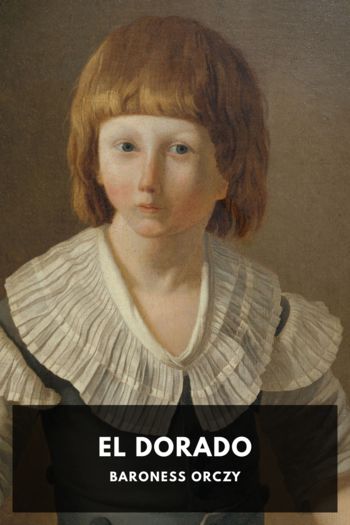El Dorado by Baroness Orczy (if you liked this book .txt) 📕

Description
In the Scarlet Pimpernel’s fourth outing, he and his league want to free the orphaned Dauphin of France from his captors. But someone else has the same idea, although for very different, and selfish, reasons. In addition to trying to outflank his rival, the Pimpernel also has to deal with a member of his inner circle whose romance has caused him to disobey orders and put the entire plan in jeopardy. Completing his mission while once again escaping the clutches of his arch-enemy Chauvelin will push the Pimpernel to the breaking point.
Read free book «El Dorado by Baroness Orczy (if you liked this book .txt) 📕» - read online or download for free at americanlibrarybooks.com
- Author: Baroness Orczy
Read book online «El Dorado by Baroness Orczy (if you liked this book .txt) 📕». Author - Baroness Orczy
He had not raised his voice while he spoke, nor in the recounting of such inhuman monstrosity, such vile and bloodthirsty conspiracy against the liberty, the dignity, the very life of an entire nation, did he appear to feel the slightest indignation; rather did a tone of amusement and even of triumph strike through his speech; and now he laughed good-humouredly like an indulgent parent who is watching the naturally cruel antics of a spoilt boy.
“Then from this hell let loose upon earth,” exclaimed St. Just hotly, “must we rescue those who refuse to ride upon this tide of blood.”
His cheeks were glowing, his eyes sparkled with enthusiasm. He looked very young and very eager. Armand St. Just, the brother of Lady Blakeney, had something of the refined beauty of his lovely sister, but the features—though manly—had not the latent strength expressed in them which characterised every line of Marguerite’s exquisite face. The forehead suggested a dreamer rather than a thinker, the blue-grey eyes were those of an idealist rather than of a man of action.
De Batz’s keen piercing eyes had no doubt noted this, even whilst he gazed at his young friend with that same look of good-humoured indulgence which seemed habitual to him.
“We have to think of the future, my good St. Just,” he said after a slight pause, and speaking slowly and decisively, like a father rebuking a hotheaded child, “not of the present. What are a few lives worth beside the great principles which we have at stake?”
“The restoration of the monarchy—I know,” retorted St. Just, still unsobered, “but, in the meanwhile—”
“In the meanwhile,” rejoined de Batz earnestly, “every victim to the lust of these men is a step towards the restoration of law and order—that is to say, of the monarchy. It is only through these violent excesses perpetrated in its name that the nation will realise how it is being fooled by a set of men who have only their own power and their own advancement in view, and who imagine that the only way to that power is over the dead bodies of those who stand in their way. Once the nation is sickened by these orgies of ambition and of hate, it will turn against these savage brutes, and gladly acclaim the restoration of all that they are striving to destroy. This is our only hope for the future, and, believe me, friend, that every head snatched from the guillotine by your romantic hero, the Scarlet Pimpernel, is a stone laid for the consolidation of this infamous Republic.”
“I’ll not believe it,” protested St. Just emphatically.
De Batz, with a gesture of contempt indicative also of complete self-satisfaction and unalterable self-belief, shrugged his broad shoulders. His short fat fingers, covered with rings, beat a tattoo upon the ledge of the box.
Obviously, he was ready with a retort. His young friend’s attitude irritated even more than it amused him. But he said nothing for the moment, waiting while the traditional three knocks on the floor of the stage proclaimed the rise of the curtain. The growing impatience of the audience subsided as if by magic at the welcome call; everybody settled down again comfortably in their seats, they gave up the contemplation of the fathers of the people, and turned their full attention to the actors on the boards.
II Widely Divergent AimsThis was Armand S. Just’s first visit to Paris since that memorable day when first he decided to sever his connection from the Republican party, of which he and his beautiful sister Marguerite had at one time been amongst the most noble, most enthusiastic followers. Already a year and a half ago the excesses of the party had horrified him, and that was long before they had degenerated into the sickening orgies which were culminating today in wholesale massacres and bloody hecatombs of innocent victims.
With the death of Mirabeau the moderate Republicans, whose sole and entirely pure aim had been to free the people of France from the autocratic tyranny of the Bourbons, saw the power go from their clean hands to the grimy ones of lustful demagogues, who knew no law save their own passions of bitter hatred against all classes that were not as self-seeking, as ferocious as themselves.
It was no longer a question of a fight for political and religious liberty only, but one of class against class, man against man, and let the weaker look to himself. The weaker





Comments (0)